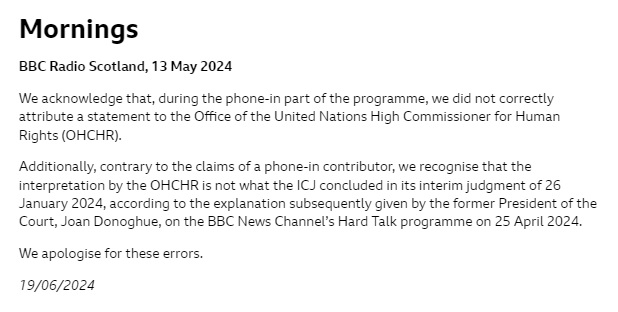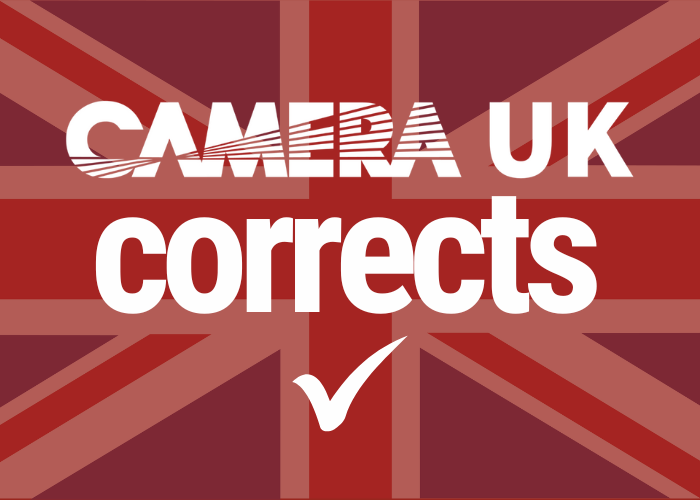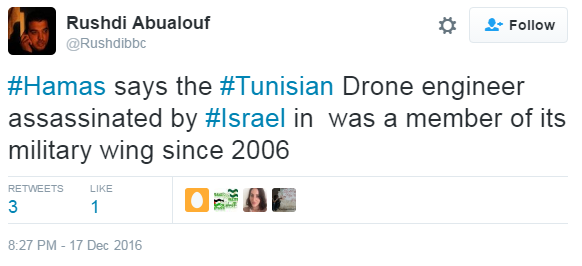Last month we documented an edition of a BBC Radio Scotland programme in which an invited guest – the head of the Scottish Palestine Solidarity Campaign – promoted an antisemitic trope as well as disinformation concerning the ruling of the International Court of Justice in January.
BBC RADIO SCOTLAND PROMOTES MORE ICJ DISINFORMATION
CAMERA UK submitted a complaint to the BBC on both those issues. At the time, that programme was still available online and would remain so for over three weeks.
Eight days after our submission was made we were informed that it would take the BBC more time to address our complaint. On June 18th – after the programme was no longer available online – we were informed that:
“We are writing to say sorry that we’ve not been able to reply to your complaint within the time period we aim for. We manage this for most complaints, but it’s not always possible – we apologise that it’s now overdue.”
Several hours later on June 18th we received the following communication from the BBC Scotland Complaints Team:
“Thank you for getting in touch about Mornings on 13 May 2024. We know people appreciate a prompt response and unfortunately we’ve taken longer to reply than usual – please accept our apologies.
We note your concerns about comments made by Mick Napier, from the Scottish Palestine Solidarity Campaign, during a phone-in about the controversy surrounding Israel’s participation in this year’s Eurovision Song Contest and pro-Gaza statements at the BAFTAs.
Mr Napier made comments about what he called the “pro-Israel lobby” and twice referred to the interim decision of the International Court of Justice of 26 January in the case brought by South Africa against Israel over Israel’s military offensive in Gaza.
Regarding Mr Napier’s comments: “We find that when somebody gets fired from their job or something because of alleged antisemitism, the [sighs] university gets emails from all over the world, from New York. The pro-Israel lobby know how to organise and they know how to influence votes, not just in the House of Commons but in the Eurovision.”
These comments were made during a live broadcast, and they were addressed by another contributor, Andy MacIver, who stated: “I think the idea – and I hope I’m not misinterpreting him – but it appeared to be that Mick was sort of suggesting that some secret pro-Israel lobby had infiltrated the Eurovision vote, which is a new one on me and I think takes fantasy to a degree we hadn’t quite heard yet…”
As noted, these comments were made during a live broadcast in which several other issues were being addressed. It’s not always possible for a presenter to pick up on and interrogate further every remark made by a contributor.” [emphasis added]
While the other contributor did indeed remark on Napier’s baseless claim that “the pro-Israel lobby” influenced votes at the Eurovision, he did not address the issue of Napier’s concurrent claim that the same “lobby” influences votes in the British parliament – and neither is it his job to do so.
The BBC’s editorial guidelines include guidance on the topic of live output which states that: [emphasis added]
“We should assess the risk of a problem arising in our live output. It is equally important to make this assessment for a local radio phone in, a high profile event like a big music festival or sporting fixture, or breaking news story of a sensitive nature, for example, a siege.”
Mick Napier has a long record of anti-Israel activism which any risk assessment conducted before inviting him to contribute to this hour-long item should surely have taken into account.
The same guidance states:
“If offensive comments are expressed during live interviews, the interviewer should normally intervene, challenge the comments where appropriate and/or distance the BBC from the comments. If this doesn’t happen we may need to consider making an on-air apology at the earliest opportunity. Potentially offensive comments include remarks that may be interpreted as, for example, racist, sexist, homophobic, prejudiced against a religious group, or reflecting an unflattering national stereotype.”
And:
“If it is established during a live programme that a factual error has been made and we can accurately correct it then we should admit our mistake clearly and frankly. Saying what was wrong as well as putting it right can be an important element in making an effective correction. Where the inaccuracy is unfair, a timely correction may dissuade the aggrieved party from complaining. Any serious factual errors or potential defamation problems should be referred immediately to Programme Legal Advice.”
Nevertheless, not only did Kaye Adams fail to challenge Napier’s entirely predictable claim that a ‘pro-Israel lobby’ influences voting in the British parliament, but no on-air apology was made. Moreover, the BBC dragged out the handling of CAMERA UK’s complaint until the programme was no longer available online, meaning that no apology or clarification was added to its webpage during the three weeks that online listeners could still access the broadcast.
BBC Scotland’s response to CAMERA UK’s complaint continues: [emphasis added]
“Regarding Mr Napier’s comments about the ICJ interim ruling in the case of South Africa v Israel, we acknowledge that this interpretation was erroneous and not what the ICJ decided. When Mr Napier made his initial comment “…the International Court of Justice has said we’re dealing plausibly with a case of genocide…” live on air, we sought to clarify his statement and began fact-checking it.
Some time after Mr Napier made his first statement about “plausible genocide”, he repeated the claim: “…the International Court of Justice decision that there’s a plausible case of genocide…”
At this point Kaye intervened and read out the statement by the UN OHCHR sent to her by her senior producer.
We acknowledge that we did not attribute the statement to the OHCHR, and we acknowledge that the interpretation by the OHCHR is not what the ICJ concluded, according to the explanation of its interim judgment made by the former President of the Court, Joan Donoghue, on the BBC News Channel’s Hard Talk programme on 25 April. We also acknowledge that the case South Africa v Israel is ongoing.
Please be assured that your comments have been discussed with the programme team.”
In fact, that ‘intervention’ prompted by a “senior producer” misled audiences even further because Adams not only failed to clarify the source of the statement but actually claimed that it came from the ICJ:
Adams: “Yeah, I have that statement…I have that in front of me actually from the International Court of Justice: ‘the ICJ found it plausible that Israel’s acts could amount to genocide and issued six provisional measures ordering Israel to take all measures within its power to prevent genocidal acts including preventing and punishing incitement to genocide, ensuring aid and services reach Palestinians under siege in Gaza and preserving the evidence of crimes committed in Gaza’. So that that is that in full.” [emphasis added]
The response we received from the BBC Scotland Complaints Team does not state that a clarification would be issued but on June 19th the following entry appeared on the BBC’s Corrections and Clarifications webpage. As we see, the BBC’s clarification does not acknowledge that the inaccurate and misleading statement given to Adams by “her senior producer” as part of of the BBC’s “fact-checking” process was erroneously presented on air as having come “from the International Court of Justice”.

While that apology is of course welcome, its appearance over a month after the item concerned was aired and after unknown numbers of additional listeners had accessed the programme during the four weeks that it remained available online of course renders it largely meaningless.
Once again we see that the BBC’s repeated failure to address complaints within its self-defined time-frame compromises its supposed commitment to accuracy and results in the spread of what was in this case deliberate disinformation touted by a political activist.
Notably, (see ‘related articles’ below) this is at least the seventh item of BBC content relating to the ICJ’s ruling to have been corrected in a manner which does not adequately inform BBC audiences that they had been misled by claims made in BBC content.
Related Articles:
BBC UNABLE TO REPLY TO A COMPLAINT ABOUT ITEMS IT ALREADY AMENDED






The IPC (aka BBC) is well aware that their “apologies” issued one month after lies and omissions are completely valueless – and they will continue with their plans to eliminate Israel off the map. Whilst on that tack, why is it that the IPC’s sponsor (Iran) can attack Israel and its allies via their puppets – whilst being immune from attack by Israel and its allies ?